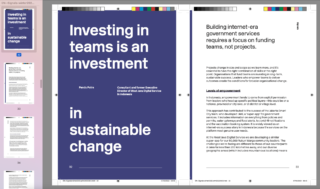
Building internet-era government services requires a focus on funding teams, not projects.
Projects change in size and scope as we learn more, and it’s essential to have the right combination of skills at the right point. Organisations that fund teams are investing in long-term, sustainable success. Leaders who empower teams to deliver outcomes create the conditions for broader organisational change.
Levels of empowerment
In Indonesia, empowerment tends to come from explicit permission from leaders who head up specific political layers—this could be on a national, provincial or city level, or at district or village level.
This approach has contributed to the success of the Jakarta Smart City team, who developed JAKI, a ‘super-app’ for government services. It includes information on everything from policies and permits, water gateways and flood alerts, to covid-19 notifications and the vaccination booking system. It is widely viewed as an internet-era success story in Indonesia because the services on the platform meet genuine user needs.
At the West Java Digital Service we are developing a similar super-app for our 50,000 Rukun Warga community leaders. The challenges we’re facing are different to those of our counterparts in Jakarta less than 200 kilometres away, and our diverse geographic areas (which includes mountainous locations) means fewer people have easy access to the internet. The provincial government provides funds to villages across the province so they can provide the community leaders with smartphones—there are usually at least 10 in each village. The leaders then become the service points for local citizens to access our services through our super app. This became essential during the pandemic when citizens needed access to verify their identity before they received social security money.
Another example of a success story comes from 2019, when the Ministry of Education, Culture, Research, and Technology launched a national procurement initiative for schools. An empowered digital team carried out user research and took an iterative approach to design. This helped them steadily increase digital uptake, delivering to 1,500 users at launch and 146,000 users within 2 years.
Focus on outcomes, not outputs
Disempowered teams easily become victims of their leaders telling them what solution to deliver rather than which problem to solve. Unfortunately, this behaviour is still present in Indonesia—often where top government sponsors have failed to instil a culture where organisations focus on the outcomes, not just outputs.
There are still occasions when government leaders talking about ‘Digital’ speak about ‘launching things’ in the same breath, but thankfully much less so than 5 years ago. The emphasis back then was on creating flashy, gimmicky, newsworthy applications rather than on long-term, strategic initiatives that would help us progress towards meaningful, sustainable outcomes.
An example of the former would be when many government entities tried to create Amazon-like marketplaces for small and medium enterprises (SMEs). The intended outcome was that SMEs in their regions could ‘go digital’ and increase their profits, but the commissioned output was a slick-looking website with very little research or insight into SME or potential customer needs. Lack of promotion also meant that once delivered, the service failed to reach those it was intended to help. Had the team been empowered to conduct user research, test iterations, and promote the service to achieve the desired outcomes, it may have succeeded. Instead, delivery was focused on the website as an output.
Without consistent, empowering leadership, products become projects, user-centred becomes stakeholder-centred, and delivery-focused becomes launch-focused.
Change needs to be whole, not partial
Where they exist and they are empowered, digital teams in Indonesia have been effective. For services to improve across government, these approaches need to become the norm.
Leading by example is a good way to bring other parts of government on the transformation journey, but the culture shift towards user-centric, data-driven, agile delivery has to be led from the top. If everyone involved in delivering a digital service is aligned, we stand a far better chance of it meeting user needs.
In Indonesia, a lot of the problems occur because of the silos between different levels of government. Most have different priorities because they are not aligned and many are not digital-first. Too many people do not understand the importance of qualitative and quantitative research in the delivery process.
We can see it clearly on Indonesian covid-19-related data and digital services. Although things are getting better, covid-19 case data at city, provincial, and national level are never aligned. There are redundant reporting apps that frontline health workers must use, just because agencies are unwilling to let go of their ego and choose the easiest tools for the users. Agencies are resistant to data-sharing and collaborative ways of working, which makes service improvement much harder.
Pathways forward
Digital service teams in Indonesia are starting to gain the autonomy they need to work on outcome-focused goals, in a culture fit for the internet era. However, they also need to make the most of these conditions and remain resilient through periods of flux that may happen due to political reasons. This will be essential to sustaining change.